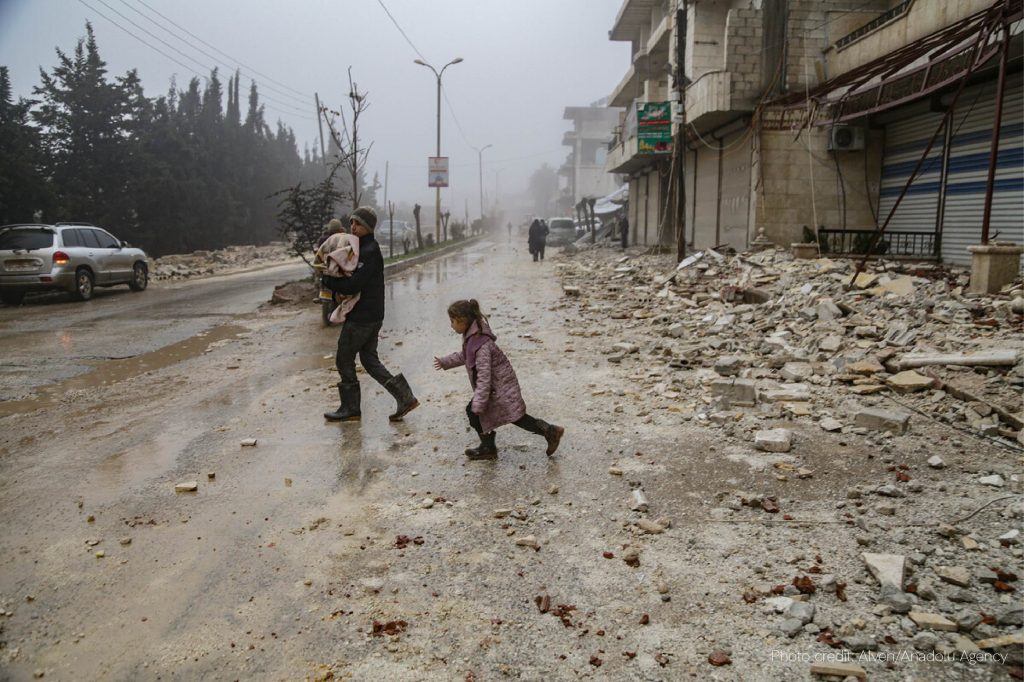ActionAid says the situation for women, girls, and marginalized communities in the aftermath of the Turkey-Syria earthquake is becoming increasingly alarming.
With reports that many families will spend another night without any form of temporary shelter in freezing cold conditions, ActionAid says it fears for the safety of those out on the streets. It is also concerned there are no provisions for women and girls who are menstruating, pregnant, or breastfeeding and have particular needs.
So far, more than 5,000 people have been killed, and more than 23,000 have been injured by the earthquake in Syria and Turkey.
Women and girls living in the regions impacted by the earthquake were already living in very vulnerable situations, having fled their homes in Syria and relying on humanitarian assistance.
Racha Nasreddine, Regional Director of ActionAid Arab Region, said:
‘‘This is a shocking situation. After 12 years of conflict in Syria, women and girls internally displaced in Syria and living as refugees in Turkey were already in a very vulnerable situation before the earthquake, and now they have had their homes and livelihoods destroyed.
“We know that women and girls often suffer the most during humanitarian emergencies. Violence against them increases, and they are more at risk of being exploited. There’s very limited access to services like hospitals, so pregnant women are at risk of complications if they can’t receive the medical care they need. Those who are menstruating will also need to manage their periods without the right products and with very little privacy.
“We are urgently assessing the situation with our partner on the ground and working through our response plan. We know there is an urgent need for spaces women and girls can go to which are safe, as well as kits which have period products in, so we will be making sure these are addressed.”
ActionAid is calling on the international community to ensure the humanitarian response to the earthquake is adequately funded, including the care of survivors of gender-based violence, and to support the safe and unhindered access of aid organizations to the hardest hit communities.
ENDS
To contact the ActionAid USA Press Office, please email christal.james@actionaid.org or call 202-777-3668.
Notes to editor
Spokespeople available:
Racha Nasreddine is the Director for ActionAid in the Arab Region covering Syria, Lebanon, Jordan, and Tunisia. Previously, she led the response to the Syrian crisis in 2015 in neighboring countries (Jordan, Iraq, Lebanon, and Egypt) and within the diaspora. She has local and international experience working across multiple sectors and countries in the Middle East and North Africa region on socioeconomic development, human rights, and cultural relations. Racha speaks Arabic and English- Currently in Jordan.
Razmi Farook is the Regional Director for Asia and Humanitarian at ActionAid. Razmi has served in the humanitarian and development sector for 20 years, working extensively on the regional and country level in the areas of disaster management, resilience, climate change, the Syria crisis, the Indian Ocean tsunami, and on issues related to migrants, refugees, and women. Razmi speaks English – Currently in Arusha, Tanzania.
Sabine Abi Aad is the Regional Communication and Campaigns Lead for ActionAid Arab Region. She has more than 20 years of experience in communication and, advocacy, project management. She is passionate about women and youth leadership, achieving social justice and gender equality. Sabine speaks Arabic and English- Based in Beirut, Lebanon.
About ActionAid
ActionAid is a global federation that works with more than 15 million people living in more than 40 of the world’s poorest countries. We want to see a just and sustainable world in which everyone enjoys the right to a dignified life and freedom from poverty and oppression. We work for social justice and gender equality, and poverty eradication

